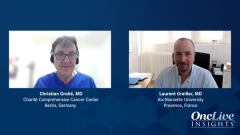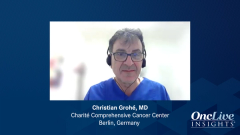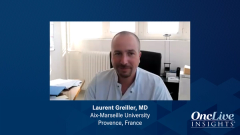
The Evolving Treatment Landscape of Small Cell Lung Cancer
Closing out their program on small cell lung cancer management, Laurent Greiller, MD, and Christian Grohé, MD, highlight what excites them most about the evolving treatment paradigm.
Episodes in this series

Transcript:
Christian Grohé, MD: What is coming next? What would be for the second or third line or first line would be options? There has been new data at the ASCO [American Society of Clinical Oncology meeting] about certain kinds of T-cell engagers, about other drugs. What would be something you would be interested in or you talked about antibody drug conjugates, but it would be something which would be interesting for you to see to come?
Laurent Greillier, MD, PhD: There are several drugs or family of drugs that are very promising today for small cell lung cancer patients. There are some bispecific antibodies which are able to engage a T-cell response, but which, of course, are called BiTE antibodies. The first in class, I think, is tarlatamab from Amgen. It’s a BiTE directed to DLL3. DLL3, as you know, is overexpressed on the surface of the small cell lung cancer, but also of neuroendocrine carcinomas. There was a paper this year for the phase 1 study of tarlatamab published in GCO [Global Cancer Observatory] with very impressive results. Now the drug has moved to phase 2 and to phase 3 in small cell lung cancer patients. So, very interesting results. Toxicity profile, which is particular with cytokinin release syndrome, which is unusual for [INAUDIBLE] oncologist. But we have to learn to manage this kind of toxicity. At ASCO, I don’t know if you’ve seen the presentation of another similar drug, the BI 764532. It’s, again, a BiTE antibody directed to DLL3 with very promising results, also. This class of treatments could be useful for our patients with small cell lung cancer in the near future.
Christian Grohé, MD: Yeah, I think that’s accurate. The portfolio, what we do see, is very impressive. Based on other clinical trials in non–small cell lung cancer, I think we do have more drugs available. I think DLL3 would be some antibody drug. Again, we already stressed that point, but I think very important is selection of the right patient cohort. It is very intriguing, I think, is at the moment that we have a breakthrough in the understanding that small cell lung cancer, obviously, is a very heterogeneous entity. It doesn’t look like that, if you look at the cell or whatever, they look very homogeneous. In terms of the genetic aberrations, we have different subtypes and maybe we have to address these subtypes specifically to better understand and improve the outcome of these patients. I think that’s very interesting. The other thing I would like to do, that’s a little sidestep, but that’s really interesting in particular in the context, what you have mentioned, we have seen now patients which have EGFR- mutated lung cancer. One has been very successfully treated with tyrosine kinase inhibitors like osimertinib. Then we have an off-target escape mechanism. These patients can develop small cell lung cancer. I think small cell lung cancer is a very interesting disease. I would just like for my side to conclude, we are very happy that at the moment we do have more options in maintenance. We are looking forward to having this data analyzed and in the second line with the addition of new drugs, but this is only a step in the right direction. I think we still have to make some ground. What do you think?
Laurent Greillier, MD, PhD: Yeah, I totally agree with you, we have to go deeper and deeper in the biology of this disease to use molecular classifications for the design of our clinical trials and try to have specific treatments for all these subgroups of small cell lung cancer. I think it’s a way where we can really change the natural history of the disease.
Christian Grohé, MD: I think so, too. Well, this was very interesting. I think we have covered all different kinds of aspects of the disease. I would just like to say thank you for listening and for paying attention to our discussion.
Laurent Greillier, MD, PhD: To our viewing audience, thank you for joining us. We hope you found this OncLive Insights® program to be useful and valuable for the treatment of your patients with small cell lung cancer. Goodbye.
Transcript edited for clarity.






































